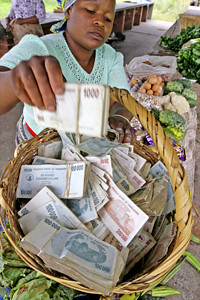
PREV ARTICLE
NEXT ARTICLE
FULL ISSUE
PREV FULL ISSUE
V11 2008 INDEX
E-SYLUM ARCHIVE
UNDER PRESSURE, GERMAN FIRM STOPS BANKNOTE PAPER SALE TO ZIMBABWE
 Last we discussed the German banknote firm that
was being criticized for supplying banknote paper to the regime of Robert
Mugabe in Zimbabwe, where mind-boggling inflation has reduced the
population to desperate poverty. On Tuesday the Wall Street Journal and
other publications put a spotlight on the firm, which announced that it
was giving in to the pressure and halting its shipments of banknote paper
to the country.
Last we discussed the German banknote firm that
was being criticized for supplying banknote paper to the regime of Robert
Mugabe in Zimbabwe, where mind-boggling inflation has reduced the
population to desperate poverty. On Tuesday the Wall Street Journal and
other publications put a spotlight on the firm, which announced that it
was giving in to the pressure and halting its shipments of banknote paper
to the country. The Munich-based company that has supplied Zimbabwe with the special blank sheets to print its increasingly worthless dollar caved in to pressure on Tuesday from the German government for it to stop doing business with the African ruler. Mr. Mugabe's regime relies on a steady supply of the paper -- fortified with watermarks and other antiforgery features -- to print the bank notes that allow it to pay the soldiers and other loyalists who enable him to stay in power. With an annual inflation rate estimated at well over 1 million percent, new notes with ever more zeros need to be printed every few weeks because the older ones lose their worth so quickly.
Giesecke & Devrient -- a secretive, family-owned Bavarian company that once made its money churning out worthless cash for the doomed Weimar Republic in the 1920s -- has been airlifting tons of blank notes to the Zimbabwean capital Harare.
Zimbabwe now has a plethora of different bills, most of which have negligible value. An accountant by profession, the MDC treasurer Mr. Mangoma says billions are rarely used in his line of work anymore and have been replaced by quadrillions -- a million billion. "Our economy is too crazy to understand," says Mr. Mangoma.
Vending machines, which take coins, fell out of service in Zimbabwe years ago. A single soda would require the deposit of billions of coins. Hyperinflation, says Steve H. Hanke, a professor of applied economics at Johns Hopkins University in Baltimore and an expert on the subject, "is a very simple equation" -- stop printing money and it stops. A bout of severe hyperinflation in Yugoslavia in the 1990s paused, he says, when the country's mint "just maxed out," and it couldn't print new money fast enough.
But, say Mr. Hanke and others, Zimbabwe will likely find another way to churn out fresh money even without special paper from Germany. He doubts much will change in Zimbabwe unless it gets rid of its central bank and adopts an entirely different monetary system.
Mr. Gono says he's "got a Plan B" to cope with the German paper deficit. It's secret, he says.
To read the complete article, see: Zimbabwe Can't Paper Over Its Million-Percent Inflation Anymore (http://online.wsj.com/article
The indignation reached London as well. The firm is also
the maker of the card used by millions of public transport
riders.
German firm Giesecke and Devrient produce the travel smart
card but also supply Zimbabwe with banknotes - a means the discredited
leader uses to control his beleaguered people.Mayor Boris Johnson vowed Transport for London would not renew the firms contract, which is sub contracted out by supplier EDS. The deal runs out and the end of August.
Johnson told the Evening Standard: "It is a huge frustration to learn that there is any link between the Oyster card and a firm providing services to Zimbabwe."
To read the complete article, see: Oyster firm dumped for Zimbabwe links (http://www.thelondondailynews
-zimbabwe-links-p-900.html)
Wayne Homren, Editor
The Numismatic Bibliomania Society is a non-profit organization promoting numismatic literature. See our web site at coinbooks.org.
To submit items for publication in The E-Sylum, write to the Editor at this address: whomren@gmail.com
To subscribe go to: https://my.binhost.com/lists/listinfo/esylum
All Rights Reserved.
NBS Home Page
Contact the NBS webmaster
